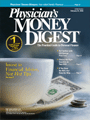Publication
Article
Physician's Money Digest
PRN: Health Pays Off
Author(s):
I just saw the results of a questionnairethat asked physicians, "Do you practicewhat you preach?" and was surprised tosee that a majority admitted that theydo not. I am sure that you amateur psychologistscould have a field day withthe why's of this supposedly informedbut obviously self-destructive behavior.But let'slook at this phenomenon froma financial perspective.
Presumably, a longer and healthierlife by itself would be at the top ofeveryone's list, regardless of the financialconsequences. And although livinglonger obviously costs more than livinga shorter life, the consequences ofneedless and avoidable poor healthturn out to be as expensive as a longand healthy life.
Take Smoking
First of all, without too much nitpicking,let's stipulate that the statisticstell us that about half of what makes ussick and die is preventable. Let's startwith the easy, low-hanging fruit likesmoking. Amazingly, about one of fourof us still smokes, resulting in an annual,after-tax cost of about $2000. If youspend 50 years smoking, that's $100,000that could have been invested to conservativelyyield about $300,000. Weknow that smoking takes about adecade off the average smoker's lifeand starts in the teen period, so theincome lost is taken from your later,most economically productive years. Ifyou're a professional, that's in theseven figures, folks.
Add to this 50 years of increasedcleaning costs, additional insurance surcharges,and the proven increase inincome lost from disability. Even withoutfiguring in inflation, you're lookingat another six figures. These hugemonies alone could easily finance yourkids' education and/or your retirement.
On to Overindulgence
Okay, that was too easy. Whatabout the 50% of us who are weight-challengedand lack exercise? If youjust look at the excess cost of foodover a lifetime of an overeater, it canbe huge. How about the consistentextra course ordered in a restaurant orthe unnecessary extra purchases at themarket for the whole family? Do themath and it's another six figures. Next,add lower insurance, clothing (plus-sizesoften cost more), and health carecosts (eg, deductibles, copays, uncoveredexpenses, etc), and you haveanother six figures.
Let's look at the 10% or so of us whodrink too much or use drugs. The financialgain in not paying for those expensivesubstances is huge and dropsdirectly to the bottom line. Even withoutthe indirect costs of disability, legalexpenses, etc, you are again looking ata minimum six-figure expense increaseover a lifetime, shortened or not.
Bad health habits have big front-endcosts and even bigger back-end expenses.If you have one or more of theseproblems and need money, look no furtherto solve both issues. On a financialbasis alone, making any one of thesechanges will in time greatly improveyour financial health.
Although this is a column focused onmoney, the greatest gains in avoidingobvious self-destructive behavior arephysical, emotional, and even spiritual.Whichever of these reasons motivatesyou, congratulations. These benefits ofpositive change always travel together.
Jeff Brown, MD, CPE, a practicing
physician who is a partner on
the Stanford University Graduate
School of Business Alumni Consulting
Team, teaches in the Stanford
School of Medicine Family
Practice Program. He welcomes questions or
comments at jeffebrownmd@aol.com.
